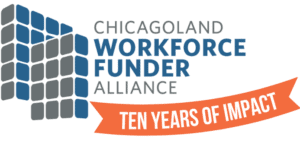George Floyd, Breonna Taylor, Ahmaud Arbery, and so many others; I cannot start this post without saying their names and centering them in my thoughts. Structural racism affects our work at the Funder Alliance in so many ways. We see it in the occupational segregation influencing our work in the service sector, it has dictated our investments in construction workforce, and it frames the work of our partners in financial services. It is present in every sector and every career pathway, and as our partners at Policy Link show, it is a dominant force on the employment impact of our current crisis. While it is in some ways heartening to see issues we have been working on for years rise in the public discourse, it is also deeply frustrating to see the slow, often non-existent progress we have been making.
Like a lot of white people, I am trying my best to listen to and center the voices and perspectives of people of color. There are so many but I especially appreciated this post and this post from two of our workforce thought leaders Clair Minson and Michelle Wilson. They are both fiercely calling the question of deep self-reflection for those of us in the workforce development field. I also found myself grateful for and moved by the voice of my colleague Will Cordery, who so eloquently reminds me how the field of philanthropy is deeply complicit as well.
However, I recognize there is a balancing act here. If all a white person does is listen, and lift up and center what people of color are saying, and nothing else, that is not good enough. In fact our tendency to stop there is part of the problem. I am immensely grateful for all the people of color in my life who through conversations or trainings we have been through together, have helped me see the truth. But I also see how exhausting and unfair that is for them, and recognize it is not their job to help people like me. White people need to step up more and educate each other on the reality of our society. We need to stop expecting people of color to come up with the solutions and fight for the necessary changes, when it is white people and the institutions and structures we created that are the problem. We can start by calling out how we benefit from these structures.
The day before Mr. Floyd was murdered by agents of the City of Minneapolis, I had my own personal encounter with a police officer. Driving home from my once-weekly shopping trip I went too quickly through a stop sign and got pulled over. What did I feel? A little stressed, a little embarrassed, and also a little annoyed. But fear, no, I felt absolutely no fear. See, I was two blocks from my home in Oak Park, this was a village police officer, and most importantly, I am a white, cis gender male. I knew the exact range of possible outcomes. And what did happen? Nothing. The officer gave me a warning, and a friendly reminder about how accidents can happen close to home.
This is just one of so many ways white privilege manifests. I benefit from so many more, never having to even think about them, which is a privilege unto itself. It has taken time and education to see them, for example I did not know the GI Bill that put my grandfather through college excluded black people, until I did. White people like me need to acknowledge these privileges and talk openly about them, especially with other white people and with our own children. We need to explain how in most cases the existence of these benefits is not the problem, after all not living in fear of police and public subsidy of education are both good things. The problem is how they were and still are systematically denied to non-white people. Perhaps more importantly we must explain to our white community that the solution is not simply granting equal privileges to all, and moving on like the last 400 years did not happen. Equity requires righting the wrongs of the past.
Will Cordery said it much better, “this is no time for white guilt or white tears. This is the time to acknowledge the white privilege that keeps you safe is a weapon to most of us Black and Brown folk.” I agree, Will, and it is time for white people to take the responsibility to disarm.
